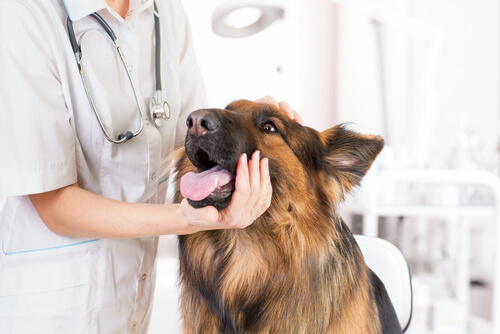How to Know If a Dog is Healthy, Based on its Stools

Learn What Your Dog’s Stools Can Reveal About its Health

No matter what type of living being it is, fecal matter is a great source of information regarding an animal’s health and, of course, this reveals what they are ingesting.
So, if you love your four-legged friend, be sure to carefully observe your dog’s stools as you discard them. By doing this, you can have the peace of mind that everything in your furry friend’s body is functioning correctly. You will have the advantage of knowing whether to immediately take your dog to the veterinarian if you discover that something is amiss.
If there is a problem, it can most likely be resolved by making some adjustments in the dog’s diet. But if there are other underlying issues, you will have peace of mind from knowing that you acted immediately. A fact that will also contribute to greater and quicker possibilities of the animal recovering.
By observing your dog’s stools, you can easily determine if your dog is healthy. So, when the time comes to clean up after your dog, be sure not to miss the opportunity to check your dog’s stools, to make sure that he is healthy.
Find Out Whether Your Dog is Healthy by Keeping an Eye on Its Stools
Rest assured that by observing your dog’s stools will give you the ability to learn about it’s digestive system. It can also provide helpful insights regarding the quality of the food that the dog is ingesting.
Let us begin with the principle that an adequate diet prevents digestive issues. If the dog is eating appropriate, good-quality food, it’s stools should:
- Be small.
- Be relatively infrequent.
- Have the right texture (not too soft, and not too stiff.)
- Be lightly fragrant (otherwise, they should not be stinky.)
This is a sign that the animal is correctly assimilating all the nutrients in its food. In contrast, you should bear in mind that stinky stools are usually a sure-fire indicator that the food you are providing is somehow flawed, or that you are otherwise feeding the animal incorrectly or off-schedule. It could also be that your four-legged friend is suffering with a food allergy.
Other Factors to Consider When Keeping an Eye on Your Dog’s Stools
The other factors that you should keep in mind in order to know if a dog is healthy, or not, based on its stools, are the following:
- There should be no presence of blood or mucous membranes.
- They should have a uniform color. If the dog’s stools become significantly light-colored, it may be due to a lack of digestive enzymes. A high consumption of red meat, on the other hand, will generate darker tones, because of the hemoglobin.
- The excrement should not contain remains of foreign elements (bones, plastic, wood, tissues, etc.). If you see anything foreign in your dog’s stools, you should pay special attention. Make sure that the dog does not ingest objects that could cause choking, as well as a variety of digestive problems.
Tips for Preserving Your Dog’s Digestive System

In short, if you want a strong, healthy dog, start by feeding it correctly and be sure to observe its stools to make sure everything is in check. Also, be sure to remember that:
- A trusted veterinarian should be the one to tell you what food is best for your pet, at each stage of its life, and according to your dog’s particularities. Additionally, you must determine the appropriate, daily portion size for your dog.
- If you choose to give your dog homemade or natural foods instead of kibble, consult a trusted specialist in animal nutrition to ensure that you are appropriately covering your dog’s nutritional requirements.
- You should not give into the temptation of giving your pet any food that has been prepared for humans. Aside from the fact that some ingredients can be toxic to your dog, it is highly unlikely that this type of “diet” would provide your dog with everything it needs in order to be well-fed.
- You must be sure that your dog is not eating food that contains high levels of lactose or insoluble carbohydrates. Most of the time, these ingredients are the cause of diarrhea.
Learn What Your Dog’s Stools Can Reveal About its Health

No matter what type of living being it is, fecal matter is a great source of information regarding an animal’s health and, of course, this reveals what they are ingesting.
So, if you love your four-legged friend, be sure to carefully observe your dog’s stools as you discard them. By doing this, you can have the peace of mind that everything in your furry friend’s body is functioning correctly. You will have the advantage of knowing whether to immediately take your dog to the veterinarian if you discover that something is amiss.
If there is a problem, it can most likely be resolved by making some adjustments in the dog’s diet. But if there are other underlying issues, you will have peace of mind from knowing that you acted immediately. A fact that will also contribute to greater and quicker possibilities of the animal recovering.
By observing your dog’s stools, you can easily determine if your dog is healthy. So, when the time comes to clean up after your dog, be sure not to miss the opportunity to check your dog’s stools, to make sure that he is healthy.
Find Out Whether Your Dog is Healthy by Keeping an Eye on Its Stools
Rest assured that by observing your dog’s stools will give you the ability to learn about it’s digestive system. It can also provide helpful insights regarding the quality of the food that the dog is ingesting.
Let us begin with the principle that an adequate diet prevents digestive issues. If the dog is eating appropriate, good-quality food, it’s stools should:
- Be small.
- Be relatively infrequent.
- Have the right texture (not too soft, and not too stiff.)
- Be lightly fragrant (otherwise, they should not be stinky.)
This is a sign that the animal is correctly assimilating all the nutrients in its food. In contrast, you should bear in mind that stinky stools are usually a sure-fire indicator that the food you are providing is somehow flawed, or that you are otherwise feeding the animal incorrectly or off-schedule. It could also be that your four-legged friend is suffering with a food allergy.
Other Factors to Consider When Keeping an Eye on Your Dog’s Stools
The other factors that you should keep in mind in order to know if a dog is healthy, or not, based on its stools, are the following:
- There should be no presence of blood or mucous membranes.
- They should have a uniform color. If the dog’s stools become significantly light-colored, it may be due to a lack of digestive enzymes. A high consumption of red meat, on the other hand, will generate darker tones, because of the hemoglobin.
- The excrement should not contain remains of foreign elements (bones, plastic, wood, tissues, etc.). If you see anything foreign in your dog’s stools, you should pay special attention. Make sure that the dog does not ingest objects that could cause choking, as well as a variety of digestive problems.
Tips for Preserving Your Dog’s Digestive System

In short, if you want a strong, healthy dog, start by feeding it correctly and be sure to observe its stools to make sure everything is in check. Also, be sure to remember that:
- A trusted veterinarian should be the one to tell you what food is best for your pet, at each stage of its life, and according to your dog’s particularities. Additionally, you must determine the appropriate, daily portion size for your dog.
- If you choose to give your dog homemade or natural foods instead of kibble, consult a trusted specialist in animal nutrition to ensure that you are appropriately covering your dog’s nutritional requirements.
- You should not give into the temptation of giving your pet any food that has been prepared for humans. Aside from the fact that some ingredients can be toxic to your dog, it is highly unlikely that this type of “diet” would provide your dog with everything it needs in order to be well-fed.
- You must be sure that your dog is not eating food that contains high levels of lactose or insoluble carbohydrates. Most of the time, these ingredients are the cause of diarrhea.
This text is provided for informational purposes only and does not replace consultation with a professional. If in doubt, consult your specialist.








